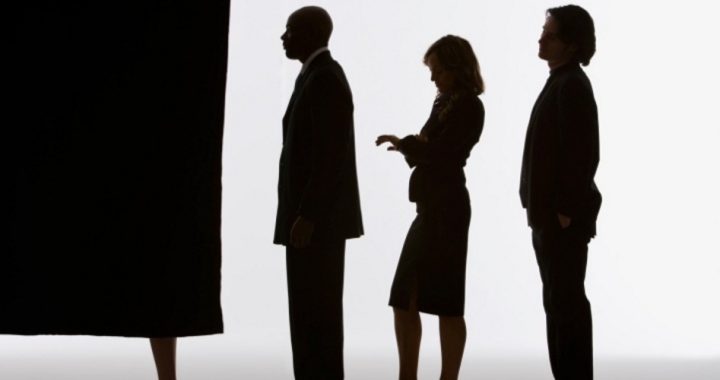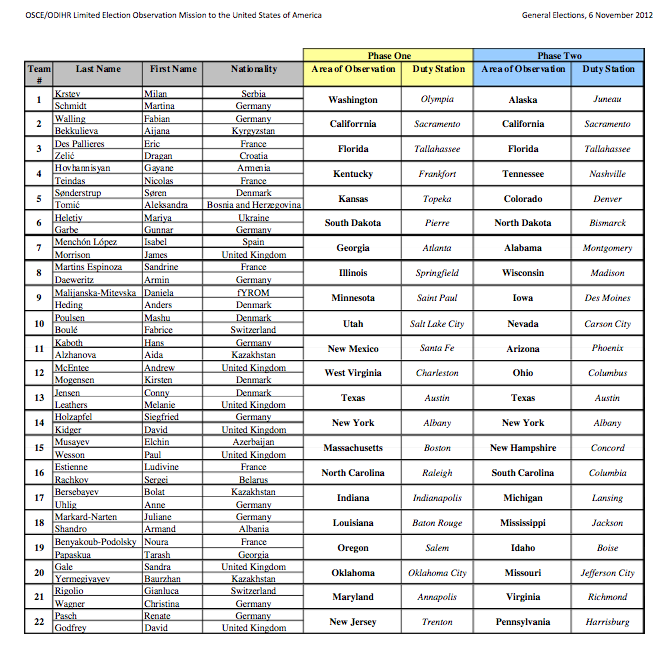
Who is Bolat Bersebayev of Kazakhstan and why is he “monitoring” our polling places in Indianapolis, Indiana and Lansing Michigan? And who is Elchin Musaeyev of Azerbaijan, and why has he been tasked with monitoring the November 6 elections in Boston, Massachusetts, and Concord, New Hampshire?
Neither Kazakhstan nor Azerbaijan are notable as paragons of electoral virtue. Nor are they models of liberty, honesty, and decency. The facts show quite the opposite.
Kazakhstan is a brutal and corrupt dictatorship run by 72-year-old Nursultan Nazarbayev, a lifelong Communist who claims to have received 95.54 percent of the vote in the 2011 elections. No one believes the Kazakh election was anything other than a scripted event with a pre-set outcome. Put “Kazakhstan human rights” into your search engine and you’ll find abundant data from numerous sources confirming that efforts to exercise freedom of expression or freedom of assembly are met with baseball bats, bullets, and prison.
Azerbaijan may even be worse than Kazakhstan. In 2009, “President” Ilham Aliyev pushed through a constitutional amendment that now makes it possible for him to be president for life.
Few expect that he will ever leave office voluntarily. His father, Heydar Alieyev, who was a KGB thug under Joseph Stalin, rose to head the Azerbaijanian KGB, which he used ruthlessly to eliminate competitors and propel himself to rulership of what was then Soviet Azerbaijan. The elder Alieyev was appointed by Leonid Brezhnev to the top leadership of the Communist Party Central Committee and Yuri Andropov rewarded him with membership in the Soviet Politburo. After Azerbaijan’s supposed “independence” from the Soviet Union, Heydar Aliyev continued the Soviet-style rule to which he was accustomed. The dynastic succession from Heydar to his son Ilham was guaranteed by the KGB structures the elder Aliyev had put in place.
Information documenting the sorry state of human rights in Azerbaijan is plentiful and easily available from many government and non-governmental sources. In 2010, a U.S. Embassy cable released by WikiLeaks revealed that despite public cordiality between Washington, D.C. and Baku, the senior U.S. diplomat in Azerbaijan, Donald Lu, considered Ilham Aliyev to be a violent gangster, likening him to a composite of Michael and Sonny Corleone of the Godfather movies.
Lu noted that Aliyev is “increasingly authoritarian and hostile to diversity of political views” despite cultivating an image of moderation. “The dissonance between Aliyev’s sensible approach to foreign affairs, manifested by the cosmopolitan image he presents to Western visitors, with his tailored suits and flawless English, and the unpleasant reality of his approach to domestic issues raises the obvious question of how these two realities coexist,” Lu wrote in his diplomatic cable.
Most Americans are probably only vaguely aware — if at all — of theses unpleasant facts about Kazakhstan and Azerbaijan. Nevertheless, news reports regarding the deployment across the United States of international election monitors from the UN-affiliated Organization for Security and Cooperation in Europe (OSCE) continue to stir growing concern among American voters and public officials.
As reported previously by The New American, Texas Attorney General Greg Abbot has warned the OSCE monitors that they will risk criminal prosecution if they interfere in the state’s election procedures. Iowa Secretary of State Matt Schultz has also warned OSCE that its monitors must obey Iowa election laws or face arrest (see here and here). Janez Lenarcic, the director of the OSCE Office for Democratic Institutions and Human Rights (ODIHR), charged that the threats from state officials is “unacceptable.”
“The threat of criminal sanctions against OSCE/ODIHR observers is unacceptable,” Lenarcic said. “The United States, like all countries in the OSCE, has an obligation to invite ODIHR observers to observe its elections.” Lenarcic, a Slovenian, was appointed to the OSCE by the government of Slovenia, which like many other OSCE member states, is a “former” communist state that is still run, largely, by “former” communists. None of these supposedly ex-communist dictatorships have yet distinguished themselves as bastions of freedom and paragons of genuine reform. In addition to Vladimir Putin’s KGB-run regime in Russia, the OSCE, based in Vienna, Austria, includes among its 56 members such democratically challenged states as: Albania, Armenia, Belarus, Bulgaria, Kyrgyzstan, Ukraine, and Uzbekistan — to name but a few of the unsavory governments that claim a “right” to monitor our elections.
Americans would understandably and rightfully be piqued even if all of the OSCE election monitors hailed from Western European countries with records for generally fair elections and (more or less) acceptable human rights. National and state elections in the United States may be far from perfect, but we’ll deal with it ourselves, thank you. But the OSCE election monitoring rankles all the more since so many of the OSCE member states sending monitors are themselves so notorious for corruption, including electoral corruption.
What about the individual OSCE monitors; what do we know about them? Virtually nothing. The OSCE has released a list (see below) naming 44 members of its “Limited Election Observation Mission to the United States of America” that are assigned to in two-person teams to cities in 22 states. Aijana Beekulieva of Kyrgyzstan, for instance, is assigned to Sacramento, California, along with Fabian Walling of Germany. Gayane Hovhannisyan from Armenia is assigned to Frankfort, Kentucky, and Nashville, Tennessee. Mariya Heletiy of Ukraine is covering Pierre, South Dakota and Bismark, North Dakota. Aida Alzhanova from Kazakhstan will be monitoring Santa Fe, New Mexico and Phoenix, Arizona. Sergei Rachkov of Belarus is observing Raleigh, North Carolina and Columbia, South Carolina. Armand Shandro of Albania is checking out polls in Baton Rouge, Louisiana and Jackson, Mississippi. (Article continues below, after list.)

Searching the OSCE website yielded no biographical information on the organization’s monitors. Nor was there information on the OSCE’s 13 Core Team Members who are overseeing the organization’s election monitoring from OSCE offices in Washington, D.C. The Core Team is headed up by Amb. Daan Everts, a longtime Dutch apparatchik at the United Nations. Others on the team come from Russia, Serbia, Macedonia, Poland, Greece, Italy, and France. The New American made repeated calls to the OSCE office to talk with Amb. Everts or the organization’s media analyst/spokeswoman, Giovanna Maiola, only to be told that neither was available for comment. One of the issues we had hoped to resolve is the discrepancy between the OSCE’s official list of 44 monitors versus reports elsewhere that the organization is deploying 150 election monitors across the country.
That represents a considerable disparity in numbers. If the actual total is 150, then who are the additional 100-plus monitors and where will they be deployed?
All of this is troubling for several reasons. First and foremost is the assault that it represents on national sovereignty and state sovereignty. As The New American’s election and voting expert Kurt Hyde pointed out in these pages in 2004 (“End UN Interference in Our Elections”), our Founding Fathers wisely left the conducting of elections — even national elections — up to the individual States. The federal government’s unconstitutional interference in our elections is bad enough; we certainly don’t need, and shouldn’t tolerate foreign countries and organizations interjecting themselves into our affairs, particularly those with such outrageous records.
The OSCE claims that its monitoring efforts are all in the interest of “transparency.” That is also a favorite term of the United Nations, the European Union, and leftist NGOs that operate in Stygian darkness while professing to be in favor of openness and light. In the interest of genuine transparency, the OSCE should make available full biographical information on its monitors, particularly detailing each individual’s history of service with his or her national government and membership in organizations and political parties. That might, at least, shed some light on the monitors’ qualifications. Another transparency matter concerns how much of the OSCE election monitoring effort is actually being funded by U.S. taxpayers. Still another transparency issue concerns the OSCE relationship with the “progressive” organizations in the United States that have requested the monitoring presence (see here and here).
This not the first time that OSCE monitors have been interjected into U.S. elections. As we have reported in previous years, these earlier electoral assaults helped establish precedents and began a process of conditioning Americans to accept UN subcontractors, such as OSCE, to monitor our elections. If allowed to continue, it is a virtual certainty that the number of monitors will continue to escalate with each successive election, their supposed “mandate” will grow ever wider, their criticism will grow more harsh, and their demands will become ever more assertive.
Related articles:
End UN Interference in Our Elections
Texas Warns UN Affiliates Monitoring U.S. Election of Prosecution Risk
Obama Backs UN-linked Election Monitors, but Texas Stands Firm
Concerned About Conservatives, UN Affiliate to Monitor U.S. Election
Leftists Call on United Nations to Monitor U.S. Election
Obama Signs Belarus Sanctions; Calls Belarus President a “Dictator”



